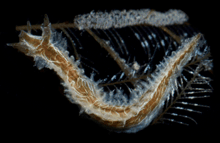Lomanotus vermiformis
| Lomanotus vermiformis | |
|---|---|
 | |
| Lomanotus vermiformis on substrate with egg mass. | |
| Scientific classification | |
| Kingdom: | Animalia |
| Phylum: | Mollusca |
| Class: | Gastropoda |
| (unranked): | clade Heterobranchia clade Euthyneura clade Nudipleura clade Nudibranchia clade Dexiarchia clade Cladobranchia clade Dendronotida |
| Superfamily: | Tritonioidea |
| Family: | Lomanotidae |
| Genus: | Lomanotus |
| Species: | L. vermiformis |
| Binomial name | |
| Lomanotus vermiformis | |
| Synonyms[2] | |
| |
Lomanotus vermiformis is a species of sea slug, a marine gastropod mollusk in the family Lomanotidae.[3]
Taxonomy
This species was synonymised with the Caribbean species Lomanotus stauberi in 1988.[2]
The specific name vermiformis is from Latin language and it means "in the shape of a worm" referring to elongate body of this species.[4]
Distribution
The distribution of Lomanotus vermiformis is circumtropical.[5] This species was described from the Red Sea.[1] It has also been reported widely from tropical seas in the Indo-Pacific region. Records from the Western Atlantic includes Florida, Bahamas and Panama.[5]
Description
The body shape is very elongate and narrow.[5] Rhinophoral sheaths are with papillae and they are elevated to cover three quarters of the rhinophores.[5] Cerata are very short and pointed.[5] Background color is brown with dark brown spots and opaque yellow lines.[5] Opaque white reticulations is also present across the body.[5] The maximum recorded body length is 40 mm,[5][6] but it is usually smaller than 25 mm.[4]
Ecology
Minimum recorded depth is 1 m.[6] Maximum recorded depth is 4.5 m.[6]
Lomanotus vermiformis feeds on the common stinging hydroid Lytocarpus philippinus[4] and on hydroids of the genus Macrorhynchia.[5] It was also found feeding on an unidentified species of hydroid in Panama, on which it is extremely cryptic.[5]
Lomanotus vermiformis can swim with lateral flexions of the body when disturbed.[5]
References
This article incorporates Creative Commons (CC-BY-4.0) text from the reference[5]
- 1 2 Eliot C. N. E. (1908). "Reports on the marine biology of the Sudanese Red Sea XI. Notes on a collection of nudibranchs from the Red Sea". Journal of the Linnean Society, Zoology, 31: 86-122.
- 1 2 Willan R. C. (1988). "The taxonomy of two host-specific, cryptic dendronotoid nudibranch species (Mollusca: Gastropoda) from Australia including a new species description". Zool. J. Linn. Soc. 94(1): 39-64.
- ↑ Rosenberg, G. (2014). Lomanotus vermiformis Eliot, 1908. Accessed through: World Register of Marine Species at http://www.marinespecies.org/aphia.php?p=taxdetails&id=532992 on 2014-10-09
- 1 2 3 Rudman W. B. (1999, August 12) Lomanotus vermiformis Eliot, 1908. Sea Slug Forum, Australian Museum, Sydney.
- 1 2 3 4 5 6 7 8 9 10 11 12 Goodheart J. A., Ellingson R. A., Vital X. G., Galvão Filho H. C., McCarthy J. B., Medrano S. M., Bhave V. J., García-Méndez K., Jiménez L. M., López G. & Hoover C. A. (2016). "Identification guide to the heterobranch sea slugs (Mollusca: Gastropoda) from Bocas del Toro, Panama". Marine Biodiversity Records 9(1): 56. doi:10.1186/s41200-016-0048-z
- 1 2 3 Welch J. J. (2010). "The “Island Rule” and Deep-Sea Gastropods: Re-Examining the Evidence". PLoS ONE 5(1): e8776. doi:10.1371/journal.pone.0008776.